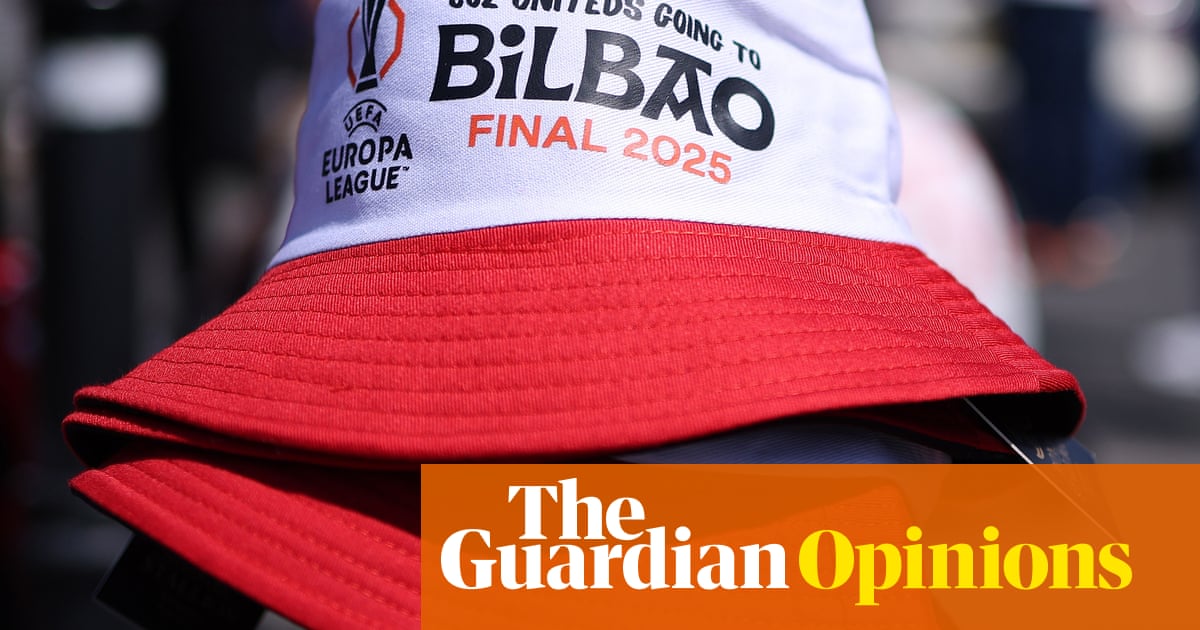The best thing about football is what a silly, mercurial game it is. You can have all the money or political clout in the world. You can put in place meticulously thought-out projects. You can think and prepare and invest and plan, and football will still spit out a Europa League final between Tottenham and Manchester United. Strategise that.
Thousands will travel to Bilbao without tickets, many will end up sleeping rough, the phone network may collapse. It will be chaotic and anarchic and at its heart will be a game between two teams desperate for victory, whose presence in the final is utterly bewildering. And in that bonkersness may lie brilliance.
The rest of the world is entitled to disagree but for English football there’s a sense – after the lack of drama over the final three months of the Premier League season, the deferential plod to anoint Liverpool, and the almost embarrassed averting of the eyes from the relegation of Southampton, Leicester and Ipswich – that we deserve this. The Europa League final will be the biggest game between two Premier League sides this year, perhaps this season.
It’s ridiculous, of course. They’ve both been terrible this season. United and Spurs are not 16th and 17th in the league by chance. Between them they’ve won two of 18 league games since the end of February. Yet both have the chance to end the season with a night of glory, a trophy and Champions League qualification.
The sense is that for United, who have somehow lifted silverware in each of the last two seasons, what matters most is a place in the Champions League and the easing of profitability and sustainability rules pressures. For Spurs, having not won anything since 2008, the silverware perhaps matters more, although increased revenue should make the spending that is necessary more likely.
United’s journey has been truly absurd. Very few roads to European glory have involved being pegged back to 2-2 after being two goals up at Newport, as they were in the fourth round of the FA Cup last season. There followed a 1-0 win at Nottingham Forest in subtle homage to Mark Robins in 1990, a 4-3 extra-time win over Liverpool that ended with Bruno Fernandes at the back of midfield and Antony at left-back, a semi-final against Coventry in which they squandered a 3-0 lead and would have lost but for the narrowest of offside decisions by the video assistant referee, and then an uncharacteristically competent victory against Manchester City in the final. It was a Cup run for the ages, so daft it felt predestined; without it, United would not even have been in the Europa League. The extra-time comeback from 4-2 down to beat Lyon 5-4, a game in which Harry Maguire at key moments impersonated both Garrincha and Dixie Dean, was simply of a ludicrous piece with what had gone before.
If these were two teams you might expect to finish fourth- and fifth-bottom of the Premier League – Bournemouth v Nottingham Forest, say, if you go by payroll – this would feel rather different: quirky, certainly, and perhaps not good in that European finals inevitably feel less special when they involve two sides from the same nation, used to routine league meetings, but equally not offensive to footballing logic and good taste.
That it is an all-English affair is not that unusual. This will be Tottenham’s sixth European final; half of them have been against English opposition. Early in the 1971-72 season, the Spurs manager, Bill Nicholson, offered his players’ wives and girlfriends a trip to the away leg of the final. They eagerly agreed, looking excitedly at possible destinations. Where would they end up? Vienna, perhaps? Madrid? Milan? Turin? Even Setúbal had an appeal. They got to go to Wolverhampton.
That was the first season after the reimagining of the Fairs Cup as the Uefa Cup. One-country finals have been a feature from the start: this year’s will be the 11th. But it is the second all-English final in seven seasons and, along with Chelsea’s saunter into the Conference League final, that fits with the more general pattern of English domination. Given the Spanish control of the competition in recent years – nine wins since 2010 – it’s perhaps worth tempering any unease, but this does feel like just another indication of the Premier League’s financial supremacy: 14 of the wealthiest 30 clubs in the world by revenue are English.
Was European competition given for this, to offer a back door into the Champions League so two giants (the fourth- and ninth-richest clubs in the world) could salvage what have been otherwise appalling seasons? Clearly it wasn’t, but then it’s a rare thing for clubs of the status and stature of United, Spurs and Chelsea to not be in the Champions League.
Hamburg, Schalke, Köln and Hertha Berlin have been in the German second division this season it’s true, and there is perhaps some broader point there about how vast old clubs can be outsmarted by nimbler and more progressive disruptors, but those four German sides have three European trophies and seven postwar league titles between them. United, Chelsea and Spurs have 14 European trophies and 26 postwar league titles. They are bigger.
Ideally the Europa League would be for big sides from the medium-sized countries and medium-sized clubs from the big countries, as it has been for the past couple of decades. Sevilla and Atlético Madrid have dominated but within all the non-Big Two Spanish success there have also been finals for teams from Russia, Ukraine, Scotland, Portugal and the Netherlands, as well as Middlesbrough, Fulham, Eintracht Frankfurt, Atalanta and Bayer Leverkusen. That feels right: not the very highest level, but a good spread from the next tier down.
